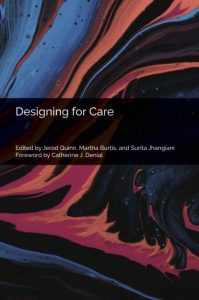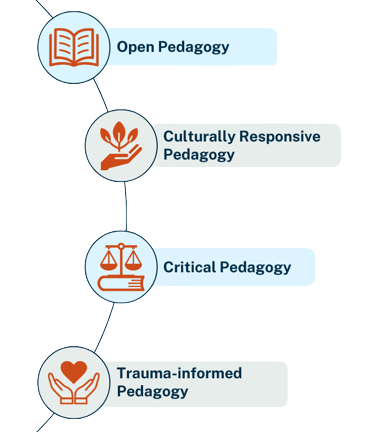Aligning Your Pedagogy with Equity
This chapter was adapted from Making Ripples: A Guidebook to Challenge Status Quo in OER Creation Copyright © 2023 by Rebus Community (Kaitlin Schilling, Apurva Ashok, Jördis Weilandt), licensed under a Creative Commons Attribution 4.0 International License
It’s key to remember that while you are creating an OER, it is merely a tool and OER-enabled pedagogy does not equal equitable pedagogy. We can still replicate harmful beliefs and practices in open education. To create positive change within the classroom and more generally in education, pedagogy needs to center equity. But what does that look like?
 In the open text, Designing for Care, the authors explain how “imagining better pedagogies is the first step in creating a powerful learning environment.” In this case, better pedagogies go beyond the delivery of course materials. It “means more humanizing pedagogies that embrace the fact that the people in our learning environments are fantastic, curious, unpredictable, capable, and multi-layered.” (Quinn, et al) Pedagogies that emphasize our shared humanity leave room for the cultivation of skills and knowledge for both students and educators by interrupting traditional pedagogical practices and promoting collective learning. “Imagining better pedagogies is the first step in creating a powerful learning environment.”
In the open text, Designing for Care, the authors explain how “imagining better pedagogies is the first step in creating a powerful learning environment.” In this case, better pedagogies go beyond the delivery of course materials. It “means more humanizing pedagogies that embrace the fact that the people in our learning environments are fantastic, curious, unpredictable, capable, and multi-layered.” (Quinn, et al) Pedagogies that emphasize our shared humanity leave room for the cultivation of skills and knowledge for both students and educators by interrupting traditional pedagogical practices and promoting collective learning. “Imagining better pedagogies is the first step in creating a powerful learning environment.”
There are so many different types of pedagogies, some more equitable than others. Below is a short list of just a few.

Open pedagogy is rooted in the belief that education should be accessible, participatory, and empowering for all learners, and that openness and collaboration are key to achieving these goals.
Culturally-responsive Pedagogy identifies and nurtures students’ unique cultural strengths to support student success and well-being. Student learning, cultural competence, and critical consciousness are the three essential components of culturally relevant education that Dr. Gloria Ladson-Billings (1995) lists.
Critical pedagogy is a theoretical framework that emphasizes critical thinking, social justice, and the promotion of democratic values. As such, teaching is a political act that can engage teachers and students in dialogue about existing power structures and the ways in which to address oppression in education.
Trauma-informed Pedagogy is a method of teaching that is dedicated to understanding the various traumatic events that students may encounter and validates how these may affect their ability to learn (Imad, 2021).
Pause & Reflect on your Teaching/Instruction Impact
Every day as educators we must ask ourselves crucial questions:
- How does my instruction style integrate into my curriculum and course design?
- Does my instruction style uplift or suppress diverse perspectives?
- Does my instruction style invite critical thinking and/or feedback?
Resources
Gray, Josie. (2023). Disability-Informed Open Pedagogy. Retrieved from https://knowledgespectrums.opened.ca/podcast/disability/
Imad, Mays. (2021). Transcending Adversity: Trauma-Informed Educational Development. To Improve the Academy, (39), 3. http://dx.doi.org/10.3998/tia.17063888.0039.301
Ladson-Billings, G. (1995). Toward a theory of culturally relevant pedagogy. American educational research journal, 32(3), 465-491.
Margolis, May-Varas, and Mead. Educational Learning Theories: 3rd Edition (2022). Education Open Textbooks.
Quinn, J., Burtis, M., Jhangiani, S., & Denial, C. J. (2022). Designing for Care. Hybrid Pedagogy Inc. Retrieved from https://pressbooks.pub/designingforcare/

